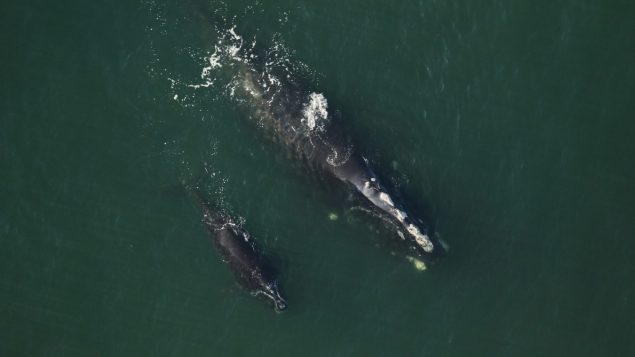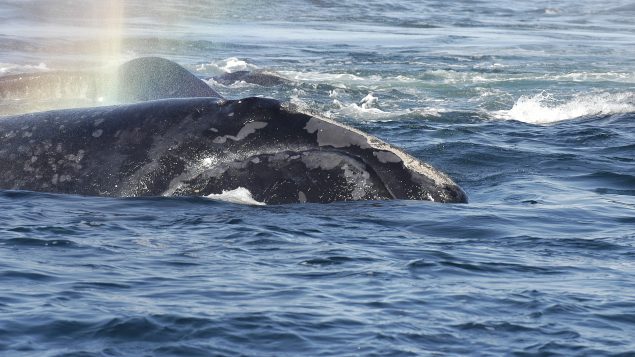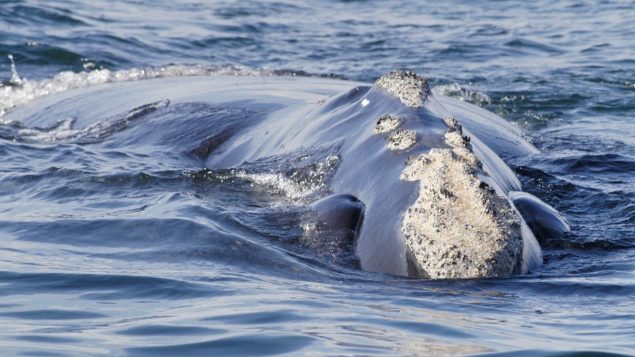A sixth dead North Atlantic right whale has been discovered in the Gulf of St. Lawrence this year, Fisheries and Oceans Canada said Thursday evening, less than a day after the federal government announced heightened measures to protect the highly endangered species.
The latest discovery was made during an aerial surveillance flight off Quebec’s Gaspé Peninsula, marking the fourth time a whale carcass has been discovered in the past 48 hours.
Researchers at the Anderson Cabot Center for Ocean Life at the New England Aquarium identified the dead female whale of unknown age as Clipper, who was first seen in 2004.
Clipper was so named because a portion of her tail had been “clipped” off from a vessel strike prior to her first sighting in 2004.

Clipper and her calf caused quite a stir when they showed up at the Sebastian Inlet in Brevard County, FL. After spending two days in the inlet, crowds lining the pier cheered when the two whales made their way back into the open ocean. (Florida Fish and Wildlife Conservation Commission, taken under NOAA research permit #15488)
Her sighting record shows that in addition to the vessel strike, she experienced two minor entanglements in fishing gear, the aquarium said. She was seen nearly every year since 2004 in all the major habitats.
“Clipper gave birth to her first and only calf in 2016, being a successfully reproductive female, she was likely to have more calves in the future,” the aquarium said in a press release.
Canadian fisheries officials said they “are currently assessing the recovery and necropsy options.”
One of the two necropsies performed so far showed that the animal had died as a result of injuries sustained “due to sharp trauma, consistent with vessel strike,” officials said.
The results of the second necropsy were inconclusive, DFO officials said. And officials were expected to begin a third necropsy Friday on a whale carcass towed to Norway, Prince Edward Island.
- Canada imposes ship speed limits after 5th endangered whale found dead
- 2 more dead right whales spotted in the Gulf of St. Lawrence
Canada’s transport ministry imposed precautionary speed restrictions on maritime traffic in the western part of the Gulf of St. Lawrence, after federal fisheries officials confirmed Wednesday the death of a fifth North Atlantic right whale found on the cost of Anticosti Island in Quebec.

A 33-year-old adult male whale named Comet is seen on a photo taken on Sept. 13, 2009 in the Bay of Fundy. Comet, named so because of a long scar on his right side, was found dead Monday near New Brunswick’s Acadian Peninsula.
(Moira Brown/Anderson Cabot Center at the New England Aquarium)
Michelle Sanders, director of Clean Water Policy at Transport Canada, said Thursday the government is ordering an interim precautionary speed restriction of 10 knots, for vessels of 20 metres or more in length travelling in the western Gulf of St. Lawrence, in the two designated shipping lanes north and south of Anticosti Island.
These protective measures also include season-long crab and lobster fisheries closures to reduce the risk of whales getting entangled in fishing gear, as well as temporary closures in other six areas in Atlantic Canada triggered by whale sightings, Adam Burns, director general of Fisheries Resource Management at DFO, told reporters during a teleconference briefing with fisheries and Transport Canada officials.
Nearly 16,000 sq. km. has been closed to fishing in the Gulf of St. Lawrence based on confirmed right whale sightings since Apr. 28, Burns said.
- Deaths of endangered North Atlantic right whales driven by manmade causes, says study
- Dead right whale known as ‘Wolverine’, had survived ship strike, entanglements
Matthew Hardy, manager of Fisheries and Ecosystem Science at DFO, said scientists from Canada and the U.S. are closely monitoring from air and sea known and potential right whale migration routes and feeding areas to try to understand the distribution of the giant cetaceans.
“This season we have recorded 280 sightings of right whales, this represents at least 78 confirmed individual whales,” Hardy said.
Many of these whales were observed in Canadian waters last season and are returning this year, Hardy said.
Scientists estimated there were 411 North Atlantic right whales last year, before these latest deaths, and seven calves had been born last fall, Burns said.
With files from CBC News







For reasons beyond our control, and for an undetermined period of time, our comment section is now closed. However, our social networks remain open to your contributions.